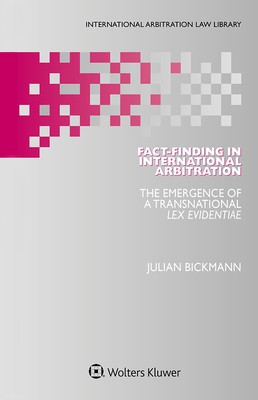
- We will send in 10–14 business days.
- Author: Julian Bickmann
- Publisher: Kluwer Law International
- ISBN-10: 9403518863
- ISBN-13: 9789403518862
- Format: 15.6 x 23.4 x 1.4 cm, hardcover
- Language: English
- SAVE -10% with code: EXTRA
Reviews
Description
Establishing a factual basis on which to apply the law can be an extraordinarily challenging process, and perhaps more so in international arbitration than in any other proceedings, due to the very different notions of fact-finding that prevail among jurisdictions. This important book assesses, for the first time, the contours of an emerging transnational law of fact-finding that promises to greatly enhance the efficiency and reliability of this crucial arbitral procedure.
In his analysis, focusing on bases that reflect current (but fluid) transnational practice, the author assembles a viable lex evidentiae from an in-depth examination and synthesis of the following bodies of source material:published arbitration proceedings and awards;
the general framework of fact-finding issues as provided for under the arbitration acts of England and Wales, the United States, Germany, Brazil, Spain, Switzerland, Austria, and Italy, as well as under the Model Law;
fact-finding stipulations under UNCITRAL Arbitration Rules as well as under various institutional rules;
soft law (such as the IBA Rules, Prague Rules, ALI/UNIDROIT Principles of Transnational Civil Procedure);
best practices as captured by legal commentary; and
investment arbitration proceedings, where many decisions and awards are nowadays publicly available.
EXTRA 10 % discount with code: EXTRA
The promotion ends in 19d.13:02:34
The discount code is valid when purchasing from 10 €. Discounts do not stack.
- Author: Julian Bickmann
- Publisher: Kluwer Law International
- ISBN-10: 9403518863
- ISBN-13: 9789403518862
- Format: 15.6 x 23.4 x 1.4 cm, hardcover
- Language: English English
Establishing a factual basis on which to apply the law can be an extraordinarily challenging process, and perhaps more so in international arbitration than in any other proceedings, due to the very different notions of fact-finding that prevail among jurisdictions. This important book assesses, for the first time, the contours of an emerging transnational law of fact-finding that promises to greatly enhance the efficiency and reliability of this crucial arbitral procedure.
In his analysis, focusing on bases that reflect current (but fluid) transnational practice, the author assembles a viable lex evidentiae from an in-depth examination and synthesis of the following bodies of source material:published arbitration proceedings and awards;
the general framework of fact-finding issues as provided for under the arbitration acts of England and Wales, the United States, Germany, Brazil, Spain, Switzerland, Austria, and Italy, as well as under the Model Law;
fact-finding stipulations under UNCITRAL Arbitration Rules as well as under various institutional rules;
soft law (such as the IBA Rules, Prague Rules, ALI/UNIDROIT Principles of Transnational Civil Procedure);
best practices as captured by legal commentary; and
investment arbitration proceedings, where many decisions and awards are nowadays publicly available.


Reviews